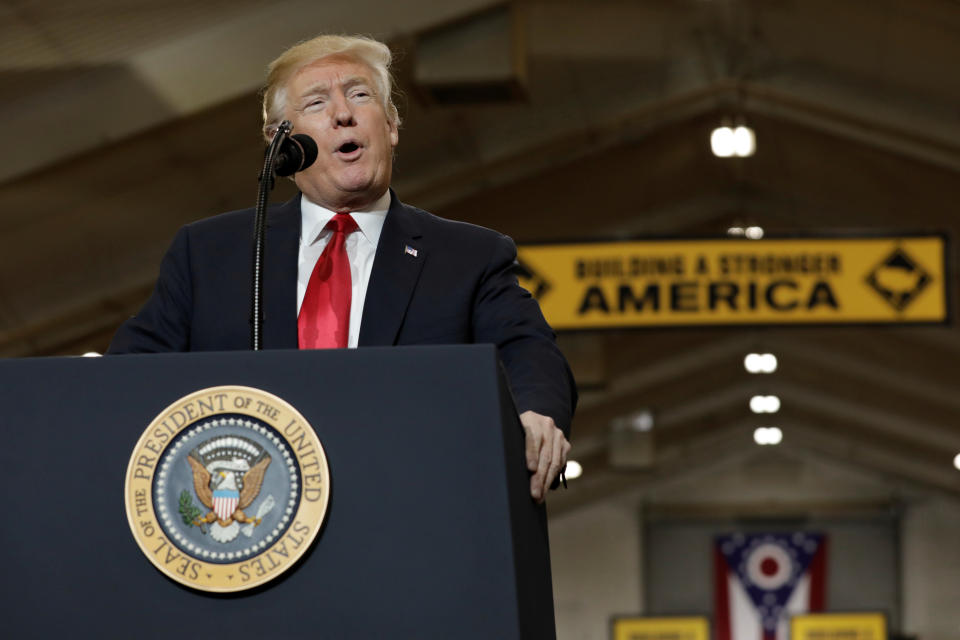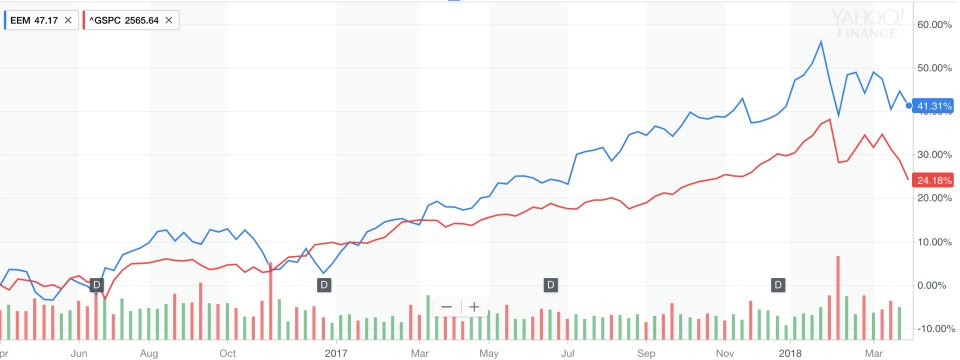World financial markets are betting that Trump is all talk and no action
Amazon’s stock price slid on Monday after President Donald Trump attacked the company on Twitter for the second time in less than a week, showing that the president’s whims can wreak havoc on a company’s stock price. But a broader look at markets – equities, bonds and currencies – shows that Trump’s threats and declarations are generally being shrugged off by investors who see the president’s pronouncements as something like the boy who cried wolf.
A growing number of asset managers say they have largely become unfazed by the president’s words, whether in tweets or official communications. They say comments about everything from foreign policy items like North Korea to tariffs on China and NAFTA, the North American Free Trade Agreement (which Trump attacked again on Twitter Sunday), are simply red meat for his base of voters and are unlikely to align with actual policy.
“Our basic view is that it’s really just a lot of noise,” said Brendan Murphy, managing director and head of global and multi-sector fixed income for Standish Mellon, a BNY Mellon subsidiary. “To the extent that individual companies are being singled out, it’s certainly important for those companies, but I wouldn’t say that it changes the broader outlook for the U.S. economy.”
From tough talk to modest concessions
Murphy expects Trump’s tough talk to turn into modest concessions from countries like China and Mexico with no substantive changes to U.S. economic policy. Trump’s No. 1 goal is for Republicans to do well in mid-term elections, he said, and a weak stock market hamstrung by trade war fears – a barometer of success Trump and his team have often pointed to when performance was strong – is unlikely to accomplish that.
“At this point we see pretty limited impact in terms of the economy itself and in the larger context of the administration’s approach to a lot of these issues, which has been to sort of talk tough and not follow through when it comes to actual actions,” Murphy said.
Financial markets seems to largely reflect this thinking. While the U.S. stock market has trudged lower since Trump began his trade spat with China on March 1, the U.S. Treasury and international currency markets have been placid after significant swings in January and February. But even equity markets and investors aren’t reacting as if a trade war – even an “easy” one for the United States to win – is looming.

Many American investors say they’re doubling down on U.S. equities, and stocks from emerging markets are seeing significant inflows. Emerging market countries include China and typically are smaller and less developed than so-called developed markets like the U.S. and Western Europe and are seen as more risky.
“If anything,” said Bin Shi, portfolio manager and researcher at Acadian Asset Management, noting his expectation for negotiation rather than trade war between the United States and China, investors “should be adding to emerging markets.”
Similarly, Dave Mazza, head of ETF investment strategy at asset manager Oppenheimer Funds, said that his firm remains overweight in its allocation to emerging markets and is seeing stronger flows into the asset class’s ETFs than in the past two years when EM has broadly outperformed developed markets.

The bond market isn’t buying it
U.S. Treasury yields would be expected to plunge in the case of an imminent trade war, as investors buy safe-haven U.S. debt to ride out downturns, pushing bond prices up and yields down. But they have been largely muted since Trump’s March 1 tariff pronouncement. Yields have declined somewhat since the March 21 Federal Reserve policy meeting, but on the 10-year note, the most widely followed, they remain nearly 30 basis points higher than at the start of the year and just five basis points below their March 1 open.
The dollar has also seen minimal movement, due in part to the market’s rethinking of Trump’s assertion that the U.S. will grow at 3%, 4% or more annually thanks to tax cuts and deregulation that could push the Federal Reserve to increase U.S. overnight interest rates more than expected this year.
“People were thinking that if the economy turned in much better performance the Fed might move or at least indicate that it was possible that it would move to four hikes and I think that speculation has pretty much diminished because we didn’t get a much stronger economy,” said Joseph Trevisani, chief market strategist at WorldWide Markets.
The Mexican peso has been on a tear
In fact, the asset that has been most tied to Trump’s trade rhetoric, the Mexican peso (MXN=X), has been the strongest currency in the world so far this year, rising more than 8% against the dollar.
Were NAFTA to be scrapped, the peso would likely fall to near the all-time low levels it hit following Trump’s election in November 2016, analysts told Yahoo Finance.
But it’s been strengthening all year largely because when it comes to Trump, markets “realize that he’s not going to follow through on a lot of these trade threats that he’s made,” said Ronald Simpson, managing director of global currency analysis at Action Economics.
“President Trump’s blustering about tariffs and getting people to pay for bad trade deals … a lot of it is bluster rather than fact,” Simpson added.
In a recent note to clients, JP Morgan’s equity strategy team compared talk of a trade war to the inclusion of a border adjustment tax in last year’s tax reform bill, saying many investors “wasted resources analyzing an extremely unlikely outcome.”
“A significant trade war started by this administration would destabilize global equity markets,” the team wrote on March 27. “Should this happen ahead of the November election, it would impair the administration’s ‘market scorecard’ and likely lead to an election loss. Lost elections open a path to impeachment, and other complications.”
The analysts concluded the note, titled “Buy Equities, Valuations are Below Historical Average,” with a prediction: “There will be strong rhetoric, but weak or no action that would destabilize equities.”
—
Dion Rabouin is a financial markets reporter for Yahoo Finance. Follow him on Twitter: @DionRabouin.
Read more:
Investors returned to risky emerging markets assets in March despite trade war fears
China may be doing more to reduce its trade surplus with the U.S. than Trump
Follow Yahoo Finance on Facebook, Twitter, Instagram, and LinkedIn.


